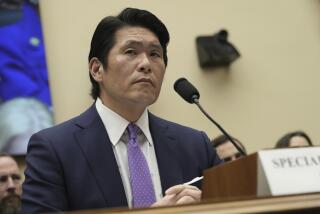Clintons’ Lawyer Accuses Starr of Ethics Violations
- Share via
WASHINGTON — President Clinton and his personal attorney accused independent counsel Kenneth W. Starr on Tuesday of violating grand jury secrecy rules and a breach of prosecutorial ethics as part of a “leak-and-smear” campaign in his Whitewater investigation.
In a scathing letter to Starr, David E. Kendall, who represents both Clinton and First Lady Hillary Rodham Clinton, cited legal rules that he charges Whitewater prosecutors have violated and said that the independent counsel is conducting a “deceptive” public relations campaign against the Clintons.
At the White House, Press Secretary Mike McCurry said that the president agreed with the sentiments expressed by Kendall’s letter. He said that both Clintons believe it is time for the attorney to speak up in rebuttal to what they charge is an ongoing campaign to smear them.
Kendall’s six-page, single-spaced, typewritten letter blasting Starr was provoked by an article Sunday in the New York Times magazine that gave details of the Whitewater investigation, quoted some prosecutors and credited the independent counsel himself with providing “background” help for the article. (Under journalism’s normal “background” rules, a source is not quoted by name. It is extraordinary for an article to identify a background source.)
Starr, in a brief letter of response to Kendall, a longtime acquaintance, denied that he or his assistants violated grand jury secrecy and said: “As to your specific allegations stemming from the recent article, we adamantly reject the suggestion of impropriety.”
Starr said that the public has a right to be as fully informed as possible about his work. His office, he wrote, has studied past investigations and found that Lawrence E. Walsh, the Iran-Contra prosecutor, and Leon Jaworski, the Watergate prosecutor, appeared on various television talk shows to discuss their investigations.
“Despite these precedents and numerous entreaties to appear on similar programs,” he said, “this office has frowned on such appearances.”
Starr’s role in the article and Kendall’s heated response embroils the independent counsel in the latest in a series of controversies at a time when a federal grand jury in Little Rock is intensifying its Whitewater investigation.
In Washington, Joseph DiGenova, a Republican activist who has served as a U.S. attorney and as an independent counsel, called the article and Starr’s role in it “ill-timed and a mistake for the independent counsel.”
The role of Starr and some of his assistants, who also posed for photographs for the magazine, also caused some dismay among other associates of the independent counsel. “I’m unhappy about it and I’m at a loss to understand it,” said one of Starr’s advisors, who declined to be identified. “I’ve been against talking out like that and I don’t know why they do it.”
Although it was the magazine article that triggered Kendall’s response, he had fretted privately for some time over news coverage generated by the office of independent counsel, including speeches, press conferences and interviews by Starr. In his letter, Kendall noted that previous correspondence with Starr on various Whitewater issues had been conducted privately, but said that the magazine article left him no choice but to respond publicly.
Kendall called Starr’s background assistance for the article a “meaningless formal fig leaf” and noted that the story, in addition to frequently quoting members of his staff by name, “refers authoritatively to your own personal beliefs, emotions and prosecutorial strategy.”
Most troubling, Kendall continued, were implications that Mrs. Clinton engaged in an obstruction of justice in connection with the disappearance of billing records for work she did on the savings and loan association that is at the heart of the Whitewater investigation. The records, subsequently found in the White House family residence, were provided to prosecutors two years after they were subpoenaed.
Kendall cited prosecutors’ comments that Starr--in his request for an extension of the Whitewater grand jury in Arkansas--was referring to the “disappearance of Hillary Clinton’s billing records” when he said that the jury had heard “extensive evidence of possible obstruction of the administration of justice.”
“Grand jury secrecy rules are aimed at preventing precisely this kind of leak-and-smear damage,” Kendall wrote. “You well know that you have no evidence whatsoever that Mrs. Clinton had anything to do with any ‘disappearance’ of the Madison Guaranty billing records, yet you’ve chosen to comment publicly on her ‘truthfulness.’ ”
Starr, in his letter of reply, denied that grand jury secrecy was violated and wrote: “The examples you cite are referred to in public court proceedings. For example, the billing records investigation is expressly discussed in our Supreme Court brief in opposition.”
Kendall also declared that the article’s “reported suggestion” by Starr that the Clintons have not cooperated in his investigation is “unfounded and false.”
He called their cooperation in the Whitewater investigation unprecedented and noted that each has voluntarily testified under oath at the White House three times in three years, that Mrs. Clinton testified several hours before a federal grand jury last year, that the Clintons have answered written interrogatories from Starr and that they have produced more than 90,000 pages of documents.
Noting that Starr was portrayed as frustrated over delays in the Whitewater investigation as it moves toward its fourth year, Kendall wrote: “What is needed is a wholehearted commitment to winding up this investigation in an appropriate way. This means not chasing every rainbow or every partisan rumor, whether in the hope of wounding or destroying a target, or for any other reason.”
More to Read
Sign up for Essential California
The most important California stories and recommendations in your inbox every morning.
You may occasionally receive promotional content from the Los Angeles Times.










